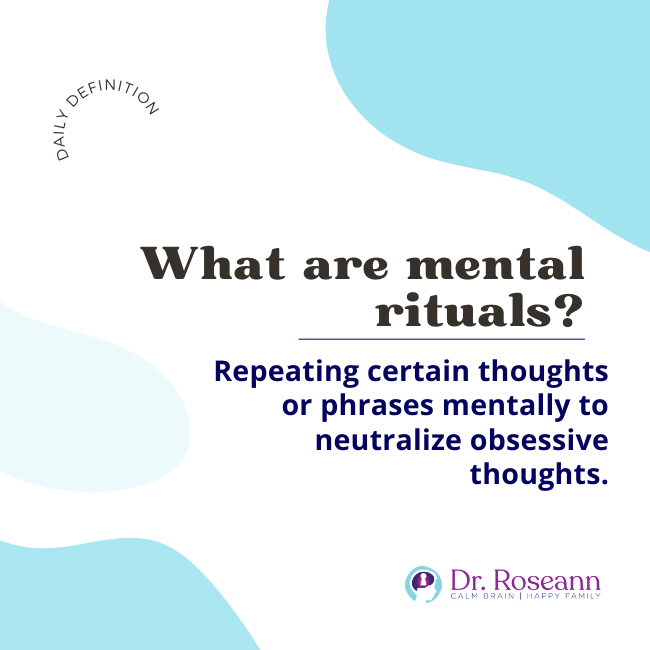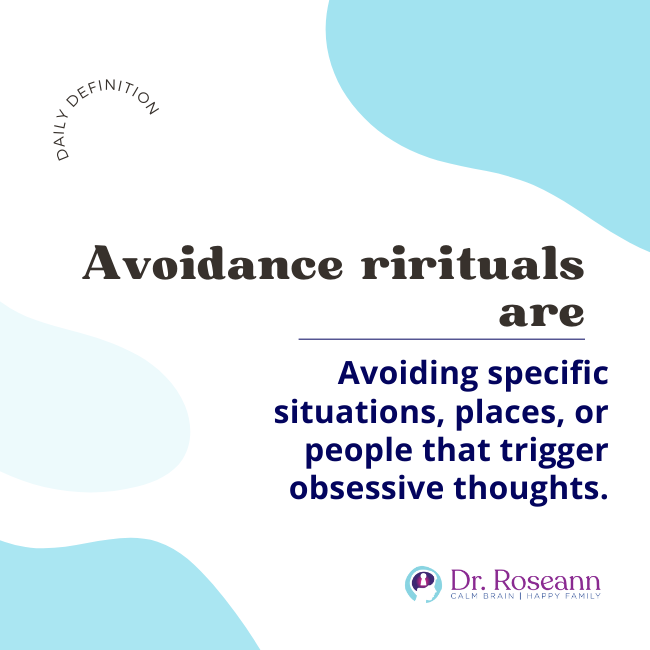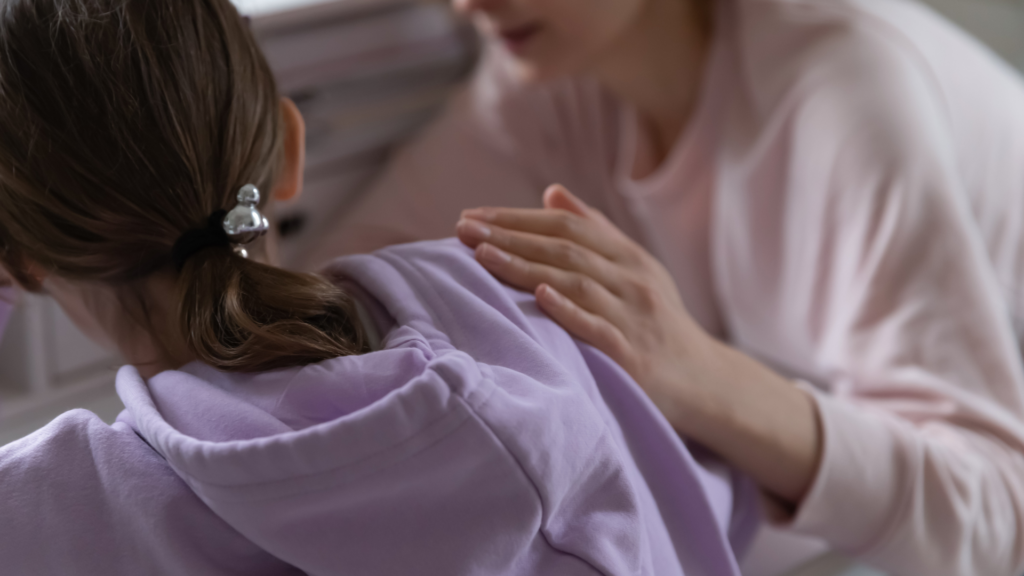Obsessive Compulsive Disorder (OCD) found a mysterious partner-in-crime in rituals. OCD is a mental health condition where unwanted thoughts, called obsessions, get paired with irresistible urges to do certain things, called compulsions.
OCD compulsions are also known as OCD rituals. These are repetitive behaviors or mental acts that individuals with OCD experience pressure as they feel compelled to perform in response to obsessive thoughts. Such persistent thoughts and rituals are aimed at reducing anxiety or preventing a feared event (Foa et al., 2012).
Mental compulsions are hard to see, as these obsessional rituals may not be obvious. OCD mental compulsions aren’t always what you would think, especially with children.
Compounding the problem is a lack of properly trained Obsessive Compulsive Disorder experts that can help to diagnose and treat this increasingly common disorder. Understanding what OCD rituals look like is the first step in understanding how to stop OCD rituals.
Common Examples of OCD Rituals
Rituals are performed in an attempt to alleviate anxiety or prevent a feared event. There are many OCD rituals children and teens may engage in as they navigate the challenges posed by their intrusive thoughts. The common rituals associated with OCD include:
Hand Washing Rituals
- Washing hands for a specific number of times or a set duration due to fears of contamination.
- Excessive handwashing and using a particular sequence or pattern while washing hands.
Checking Rituals
- Checking and rechecking locks, switches, or appliances to ensure they are turned off.
- Repeatedly checking if something is turned off a lot of time before leaving home.
Counting Rituals
- Counting objects or performing actions a certain number of times to ward off anxiety.
- Counting steps, tiles, or other items in a specific way.
Tapping or Touching Rituals
- Tapping or touching objects a certain number of times to feel “just right.”
- Touching or tapping oneself in a specific sequence or pattern.
Ordering and Arranging Rituals
- Arranging objects symmetrically or in a specific order to reduce distress.
- Spending an excessive amount of time arranging items until it feels right.
Mental Rituals
Repeating certain thoughts or phrases mentally to neutralize obsessive thoughts.

- Engaging in mental counting or prayer as a way to cope with anxiety disorders.
Hoarding Rituals
- Having a hoarding disorder or collecting and keeping items that others might consider useless or excessive.
- Compulsively acquiring items and experiencing distress when attempting to discard them.
Symmetry and Precision Rituals
- Ensuring that items are arranged symmetrically or in a precisely aligned manner.
- Feeling compelled to make things in perfect order by adjusting their position repeatedly.
Reassurance-Seeking Rituals
- Seeking reassurtance from others about whether something bad will happen.
- Repeatedly asking for confirmation or validation to alleviate anxiety.
Avoidance Rituals
- Avoiding specific situations, places, or people that trigger obsessive thoughts.

- Steering clear of activities that might provoke distress.
Help for Children and Teens with Compulsive Rituals
OCD rituals are like coping mechanisms people use to deal with the anxiety triggered by recurring obsessive thoughts and compulsive behaviors. While these rituals may seem like the right thing to do, they only bring temporary relief and often complicate life in the long run.
So, how can one break free from this cycle? An effective treatment for OCD is Cognitive Behavioral Therapy (CBT) combined with exposure therapy is a powerful tool that helps rewire the brain. People with OCD will benefit from it as it helps challenge the dominance of obsessive thoughts and gradually resist the urge to engage in their common compulsions, individuals can gain control over the mental chaos and lead a life more aligned with their preferences.
One effective technique within Cognitive-behavioral therapy is Exposure and Response Prevention (ERP). This approach involves confronting fears directly but in a controlled environment (Abramowitz, 1996). For instance, if someone has a fear of germs and typically washes their hands excessively, ERP might involve deliberately touching objects without immediately resorting to handwashing.
Although this may induce initial anxiety, through consistent practice and support, the brain learns that avoiding the ritual doesn't lead to catastrophic outcomes. This process empowers individuals to manage their OCD symptoms and regain a sense of control over their lives.
The BrainBehaviorResetTM Program uses natural, science-backed solutions to manage the symptoms of OCD in children and teens. It combines CBT and ERP with neurofeedback, PEMF therapy, magnesium supplements, and other modalities to help manage the common obsessions and mental compulsions that comes with the condition.
Remember, OCD isn't something to be ashamed of. It's just a bumpy part of the mental health journey, and the first step to conquering it is to arm yourself with the right knowledge. With the right support and tools, anyone can learn how to manage associated challenges and go about their daily activities. With natural solutions, there's no need to use Selective Serotonin Reuptake Inhibitors to address those bad thoughts and physical compulsions.
Breaking free from the loops of OCD is possible and there are different ways to go about it. There's a whole community of parents and professionals cheering you on. Keep fighting the good fight, and keep reminding your child that they are not a bad person nor are they defined by their OCD obsessions. They are awesome, capable, and deserving of a daily life filled with joy and adventure.
Parent Action Steps
☐ Learn more about OCD by listening to my It’s Gonna Be OK! Podcast and the OCD series.
☐ Listen to your child with empathy. Hear every bad thought that crosses their mind.
☐ Don't try to be a therapist yourself. Seek the help of an OCD specialist for the sake of all family members.
☐ Encourage your child and celebrate their courage in facing the bad things they feel due to OCD.
☐ Take this OCD Quiz to get the right OCD treatment plan for your child.
☐ Use the Solutions Matcher to work 1on1 with Dr. Roseann.
Citations
Abramowitz, J. S. (1996). Variants of exposure and response prevention in the treatment of obsessive-compulsive disorder: A meta-analysis. Behavior Therapy, 27(4), 583–600. https://doi.org/10.1016/s0005-7894(96)80045-1
Foa, E. B., Yadin, E., & Lichner, T. K. (2012). Exposure and response (ritual) prevention for obsessive compulsive disorder : therapist guide. Oxford University Press.
Dr. Roseann is an OCD mental health expert who frequently is in the media:
- Insider: What is OCD?
- Single Care Controlling the uncontrollable: Living with OCD during a pandemic
- MomsCove How to Help a Child with Anxiety and OCD
- Holistic Counseling Podcast: Effective Treatments for OCD
- Epidemic Answers: Neurofeedback for ADHD, anxiety, OCD and mood
- BCIA: Calming the OCD Brain with Neurofeedback and ERP Therapy
- Hope for Anxiety and OCD: Sudden Onset OCD
- Integrative Practitioner: Integrative Approaches to Treating OCD
- HappiHuman: Is it an Eating Disorder or OCD
Dr. Roseann is a Children’s Mental Health Expert and Licensed Therapist who has been featured in/on hundreds of media outlets including The Mel Robbins Show, CBS, NBC, PIX11 NYC, Today, FORBES, CNN, The New York Times, The Washington Post, Business Insider, Women’s Day, Healthline, CNET, Parade Magazine and PARENTS. FORBES called her, “A thought leader in children’s mental health.”

She coined the terms, “Re-entry panic syndrome” and “eco-anxiety” and is a frequent contributor to media on mental health.
Dr. Roseann Capanna-Hodge has three decades of experience in working with children, teens and their families with attention-deficit hyperactivity disorder (ADHD), autism, concussion, dyslexia and learning disability, anxiety, Obsessive Compulsive Disorder (OCD), depression and mood disorder, Lyme Disease, and PANS/PANDAS using science-backed natural mental health solutions such as supplements, magnesium, nutrition, QEEG Brain maps, neurofeedback, PEMF, psychotherapy and other non-medication approaches.
She is the author of three bestselling books, It’s Gonna Be OK!: Proven Ways to Improve Your Child's Mental Health, The Teletherapy Toolkit, and Brain Under Attack. Dr. Roseann is known for offering a message of hope through science-endorsed methods that promote a calm brain.
Her trademarked BrainBehaviorResetⓇ Program and It’s Gonna be OK!Ⓡ Podcast has been a cornerstone for thousands of parents facing mental health, behavioral or neurodevelopmental challenges.
She is the founder and director of The Global Institute of Children’s Mental Health, Neurotastic™Brain Formulas and Dr. Roseann Capanna-Hodge, LLC. Dr. Roseann is a Board Certified Neurofeedback (BCN) Practitioner, a Board Member of the Northeast Region Biofeedback Society (NRBS), Certified Integrative Mental Health Professional (CIMHP) and an Amen Clinic Certified Brain Health Coach. She is also a member of The International Lyme Disease and Associated Disease Society (ILADS), The American Psychological Association (APA), Anxiety and Depression Association of America (ADAA) National Association of School Psychologists (NASP), International OCD Foundation (IOCDF).
© Roseann-Capanna-Hodge, LLC 2024










